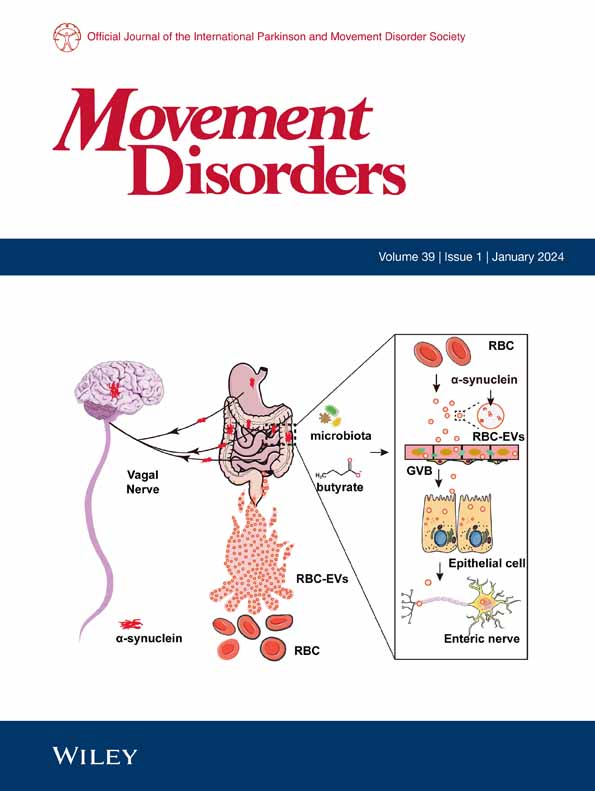求助PDF
{"title":"自主神经功能障碍对帕金森病患者运动、行为和认知波动的影响","authors":"Abhimanyu Mahajan, Christopher B. Morrow, Joseph Seemiller, Kelly A. Mills, Gregory M. Pontone","doi":"10.1002/mds.30044","DOIUrl":null,"url":null,"abstract":"BackgroundMotor and nonmotor fluctuations adversely impact the quality of life in Parkinson's disease (PD). Dysautonomia, a feature frequently associated with PD and a possible adverse effect of dopaminergic therapy, may be comorbid with fluctuations.ObjectiveWe sought to evaluate the effect of dysautonomia on motor and nonmotor fluctuations in PD.MethodsTwo hundred subjects with PD were evaluated in both on and off dopamine states to assess changes in symptoms related to dopaminergic fluctuations. Multivariable logistic regression was performed to assess the association of dysautonomia with motor, cognitive, and psychiatric worsening from on to off states with adjustment for disease duration, levodopa equivalent daily dosage (LEDD), and dopamine‐agonist LEDD.ResultsSubjects with dysautonomia had greater odds of clinically meaningful change in motor features (odds ratio [OR]: 3.0), cognition (OR: 3.4), and anxiety (OR: 4.3) compared to those without dysautonomia.ConclusionsDysautonomia may be a contributory mechanism behind fluctuations in PD. The exact nature of this relationship deserves further evaluation. © 2024 International Parkinson and Movement Disorder Society.","PeriodicalId":213,"journal":{"name":"Movement Disorders","volume":"110 1","pages":""},"PeriodicalIF":7.4000,"publicationDate":"2024-10-25","publicationTypes":"Journal Article","fieldsOfStudy":null,"isOpenAccess":false,"openAccessPdf":"","citationCount":"0","resultStr":"{\"title\":\"The Effect of Dysautonomia on Motor, Behavioral, and Cognitive Fluctuations in Parkinson's Disease\",\"authors\":\"Abhimanyu Mahajan, Christopher B. Morrow, Joseph Seemiller, Kelly A. Mills, Gregory M. Pontone\",\"doi\":\"10.1002/mds.30044\",\"DOIUrl\":null,\"url\":null,\"abstract\":\"BackgroundMotor and nonmotor fluctuations adversely impact the quality of life in Parkinson's disease (PD). Dysautonomia, a feature frequently associated with PD and a possible adverse effect of dopaminergic therapy, may be comorbid with fluctuations.ObjectiveWe sought to evaluate the effect of dysautonomia on motor and nonmotor fluctuations in PD.MethodsTwo hundred subjects with PD were evaluated in both on and off dopamine states to assess changes in symptoms related to dopaminergic fluctuations. Multivariable logistic regression was performed to assess the association of dysautonomia with motor, cognitive, and psychiatric worsening from on to off states with adjustment for disease duration, levodopa equivalent daily dosage (LEDD), and dopamine‐agonist LEDD.ResultsSubjects with dysautonomia had greater odds of clinically meaningful change in motor features (odds ratio [OR]: 3.0), cognition (OR: 3.4), and anxiety (OR: 4.3) compared to those without dysautonomia.ConclusionsDysautonomia may be a contributory mechanism behind fluctuations in PD. The exact nature of this relationship deserves further evaluation. © 2024 International Parkinson and Movement Disorder Society.\",\"PeriodicalId\":213,\"journal\":{\"name\":\"Movement Disorders\",\"volume\":\"110 1\",\"pages\":\"\"},\"PeriodicalIF\":7.4000,\"publicationDate\":\"2024-10-25\",\"publicationTypes\":\"Journal Article\",\"fieldsOfStudy\":null,\"isOpenAccess\":false,\"openAccessPdf\":\"\",\"citationCount\":\"0\",\"resultStr\":null,\"platform\":\"Semanticscholar\",\"paperid\":null,\"PeriodicalName\":\"Movement Disorders\",\"FirstCategoryId\":\"3\",\"ListUrlMain\":\"https://doi.org/10.1002/mds.30044\",\"RegionNum\":1,\"RegionCategory\":\"医学\",\"ArticlePicture\":[],\"TitleCN\":null,\"AbstractTextCN\":null,\"PMCID\":null,\"EPubDate\":\"\",\"PubModel\":\"\",\"JCR\":\"Q1\",\"JCRName\":\"CLINICAL NEUROLOGY\",\"Score\":null,\"Total\":0}","platform":"Semanticscholar","paperid":null,"PeriodicalName":"Movement Disorders","FirstCategoryId":"3","ListUrlMain":"https://doi.org/10.1002/mds.30044","RegionNum":1,"RegionCategory":"医学","ArticlePicture":[],"TitleCN":null,"AbstractTextCN":null,"PMCID":null,"EPubDate":"","PubModel":"","JCR":"Q1","JCRName":"CLINICAL NEUROLOGY","Score":null,"Total":0}
引用次数: 0
引用
批量引用
The Effect of Dysautonomia on Motor, Behavioral, and Cognitive Fluctuations in Parkinson's Disease
BackgroundMotor and nonmotor fluctuations adversely impact the quality of life in Parkinson's disease (PD). Dysautonomia, a feature frequently associated with PD and a possible adverse effect of dopaminergic therapy, may be comorbid with fluctuations.ObjectiveWe sought to evaluate the effect of dysautonomia on motor and nonmotor fluctuations in PD.MethodsTwo hundred subjects with PD were evaluated in both on and off dopamine states to assess changes in symptoms related to dopaminergic fluctuations. Multivariable logistic regression was performed to assess the association of dysautonomia with motor, cognitive, and psychiatric worsening from on to off states with adjustment for disease duration, levodopa equivalent daily dosage (LEDD), and dopamine‐agonist LEDD.ResultsSubjects with dysautonomia had greater odds of clinically meaningful change in motor features (odds ratio [OR]: 3.0), cognition (OR: 3.4), and anxiety (OR: 4.3) compared to those without dysautonomia.ConclusionsDysautonomia may be a contributory mechanism behind fluctuations in PD. The exact nature of this relationship deserves further evaluation. © 2024 International Parkinson and Movement Disorder Society.


